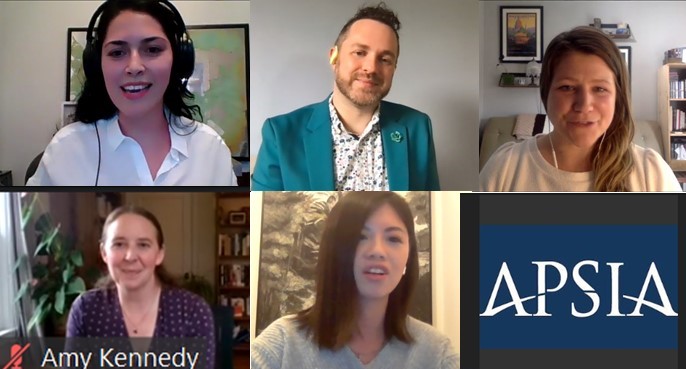APSIA Welcomes More than 100 New PISA Members
From May 3-7, 2021, APSIA hosted the fifth Public and International Service Advisor (PISA) Training, welcoming more than 100 advisors from 64 institutions.
The PISA Network brings together undergraduate and community college advisors across the United States to advance understanding of the professions of international affairs, public policy, and public administration on their campuses.
Recordings from the May 2021 PISA Trainings can be found online.
On Monday, May 3, Amy Kennedy, an APSIA alumna and PISA Network member from Syracuse University, moderated an introduction to careers in public and international service. Advisors heard from alumni Paulina Guzman, Global Engagement Officer for the City of Atlanta, Stephanie Martone, Multilateral Relations Advisor at the U.S. Department of State, Jason Terry, Director of Exchange Programs with Global Ties US, and Samantha Tu, Intelligence Analyst at Everbridge.
Speakers talked about how to build an international and public service career locally, nationally, and internationally. They recommended students showcase their creativity, flexibility, and ability to learn quickly as they look to entry-level positions. “When you take a global approach to things, the possibilities are endless!” Samantha Tu said.
On Tuesday, May 4, Christine Omolino, Director, Admission and Financial Aid for the Public Administration and International Affairs programs at Syracuse University Maxwell School of Citizenship and Public Affairs, offered a presentation explaining the primary differences between public policy, public administration, and international affairs degrees, as well as between these degrees and other professional degrees, such as in law or business.
She said students who want to work on behalf of others, who want to make the world a better place, who are curious about other places, who question why things are the way they are and how they can be better find a good home in public and international service schools.
On Wednesday, May 5, Shereen Ali, Boren Awards Program Manager for the Institute of International Education, Nicole Campbell, Director of Graduate Admissions for the George Washington University Elliott School of International Affairs, and Mike Youngson, Policy Officer and Career Development Officer at Defense Intelligence Agency, talked about ways to challenge the narrative of what ‘counts’ in applications and ways to empower students to tell their stories.
Moderated by Sharon Swabb, alumna and Career Coach at the George Washington University Elliott School of International Affairs, speakers emphasized that any experience can build tangible and intangible skills that are valued by graduate schools, employers, and fellowship programs. Students just need to make those connections in their applications. Students should give context for their work and the results/success from their individual actions. Show growth from an experience, how you took a challenge – like the pandemic – and made the most of it.
Also, on May 5, Smiti Nathan, Assistant Director of Life Design for Johns Hopkins University, moderated an open conversation to share best practices about ways to bring public and international affairs to campus. Advisors shared questions they frequently face from students and offered some resources and program ideas to address them.
On Thursday, May 6, PISA Advisor Rodia Vance, a PISA Network member from Emory University, moderated a conversation for advisors on helping students prepare – and pay – for graduate school.
Speakers Ja’net Y. DeFlorimonte, Director of Admissions for the Master of Science in Foreign Service Program at Georgetown University’s Walsh School of Foreign Service, Adelaide Isaacs, Manager of Global Admissions and Enrollment at IE University’s School of Global and Public Affairs, and Jessica Pan, Director of MPP Admissions and Scholarships for Duke University’s Sanford School of Public Policy, all described how students need to think about how graduate school fits into longer term. Schools want to see an applicant’s sense of self, how their experiences inform what they want to do, and how their program will help the applicant meet their future goals.
Finally, on May 7, APSIA’s Carmen Iezzi Mezzera and Briana Suarez offered an introduction to the ways in which APSIA can help advisors support their students. They introduced the tools on the APSIA and PISA Websites and offered their support to advisors going forward.
APSIA is grateful to the Robertson Foundation for Government for their investment in this effort.

